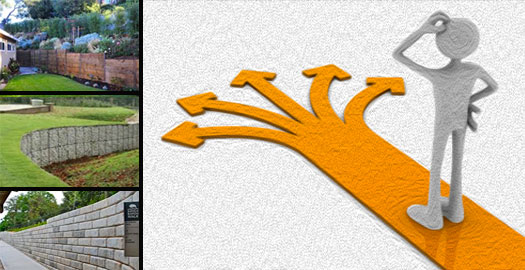
When it comes to analyzing, assessing, designing, repairing or replacing retaining walls, you will need to determine the best professional for the job. The right professional can observe your soil conditions, the existing wall if there is one, and determine how to repair it or what materials would make the best retaining wall for your situation.
Retaining Wall Types
A NJ structural engineer can help you determine the type and size of retaining wall you need and explain the pros and cons of each type of wall. In general, there are six types of retaining walls.
Anchored Walls – Anchored retaining walls are steel, concrete or masonry block walls that are reinforced with steel cables or rods. The anchors are connected to the wall and run through the retained soil in order to add stability and durability to the wall. These walls work best when there is a lot of soil to hold back or the soil is particularly unstable.
Cantilever Walls – Cantilever walls are constructed of poured concrete with reinforced steel bars. They contain a toe and base underneath the soil that provides stability and support. The height of the wall and size and style of the toe is dependent on the amount of soil to be held back and the composition of that soil.
Gravity – Gravity retaining walls are supported by their own weight. They can be constructed out of brick, stone, pavers and rocks. These walls can be angled backward into the earth they are supporting. This is the most common type of retaining walls and typically works well for shorter walls in areas that are not prone to earthquakes.
Piling Walls – Piling walls are designed with long rods or poles that are driven into the soil to provide additional support. The piles can be constructed or wood or steel. These walls work well when the base of the wall needs to start deep within the soil in order to provide adequate support.
Reinforced Concrete – Reinforced concrete retaining walls are walls that are constructed out of either poured concrete or concrete blocks and reinforced with steel rebar. In the case of concrete block, liquid concrete is poured into the holes with the rebar to stabilize the bars and provide additional support. These walls can be fairly tall.
Segmented Block – Segmented block walls are constructed with stone, concrete or masonry blocks that contain a decorative face and an interlocking system, usually a raised top piece that locks into the block above it. These retaining walls can be built fairly high.
Retaining Walls with Structural Workshop LLC
Here at Structural Workshop LLC, our NJ structural engineer can help you determine the best type of retaining wall for your residential property. We have experience in assessing and designing walls for single family homes, commercial and industrial sites, condos, co-ops and apartment complexes. To learn more about our services and to hire us to help you with your retaining wall, call us at 973-771-6970.
